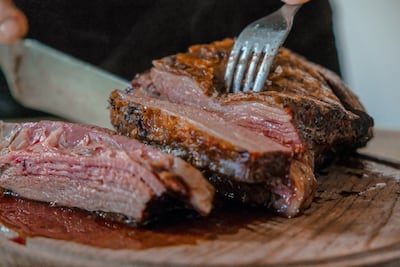Danielle Wilkinson used to believe all sorts of nutrition myths. Like many women her age who grew up in the 1990s – when ultra-slim models adorned magazine covers – carbs were the enemy and fad diets a way of life.
Now, however, the fitness trainer is passionate about educating people about the fundamentals of nutrition, especially as the proliferation of misleading advice on TikTok and Instagram gets out of hand, she says.
“Many influencers are subject to the Dunning-Kruger effect, which is when you learn a small amount of information and then believe you understand the topic fully,” Wilkinson tells The National. “This leads influencers to passionately sell products or systems that ‘worked for them’.”
People also compare themselves to others more than ever before, thanks to these social media platforms. “But a 23-year-old influencer doesn’t have the same demands, lifestyle and stressors as a 36-year-old mum-of-three who works two jobs,” she adds.
aka Dr Idz
Influencers spouting fake and often dangerous advice about the already-confusing world of nutrition are on the up, and disordered eating habits are at an all-time high.
A 2023 survey by NHS England found that 20.8 per cent of women aged 17 to 19 in the UK had an eating disorder, in comparison to 1.6 per cent in 2017, and there was an increase of 5.1 per cent among young boys of that age in that same time frame. Orthorexia, an obsession with eating foods someone considers healthy, is of particularly increasing concern in the medical community.
These statistics will only continue to rise if social media influencers – who often have hundreds of thousands, if not millions, of followers – carry on spreading misinformation.
Thankfully, there's a growing number of medical professionals with their own accounts who are countering this in their spare time.
British doctor Idrees Mughal, known as Dr Idz, has become something of a celebrity on TikTok, with 1.8 million followers.
He joined the video platform during the pandemic and was shocked by the amount of misinformation in the health space. So he started putting out evidence-based advice and debunking posts (in which he notably declares it's “time for school”). Within five months, he had half a million followers.
While Mughal has seen some scary trends crop up over the past couple of years, from people eating household cleaner borax, to a mother advising others to use potato juice to cure strep throat, the most dangerous fads are much more subtle, he says.
Carnivore diet: Subtle but deadly
The carnivore diet is the most worrying trend right now, he says. This only includes meat, fish and other animal foods, encouraging people to eat fewer plants and more saturated fats. It has some well-known proponents, such as British survivalist Bear Grylls and American podcaster Joe Rogan, and some people report feeling better once they start, which experts say is a result of the lack of fibre, as the body can sometimes struggle to digest fibrous foods.
“The issue is we won’t see the damaging effects of that until years later,” says Mughal.
“Too many people conflate how they feel with health outcomes, but you can’t feel atherosclerosis or plaque building up in your arteries,” he says. “You can’t feel your colon replicating cancerous cells, right? That’s why the carnivore diet is dangerous, but it’s a subtle danger because people won’t realise until it’s too late.”

Dr Adrian Chavez, who has a PhD in nutrition and more than 70,000 followers on Instagram, agrees this trend is concerning. He has shared numerous posts debunking the diet.
“There’s never been a study that showed eating more meat led to better rates of heart disease or cancer, or a longer lifespan,” he says. “While every single study that has looked at eating more plant foods shows lower rates of heart disease, lower rates of cancer and longer lifespan.”
Chavez has spent thousands of hours working with clients trying to undo the damage unreliable influencers have already done by getting them to believe the myths.
Clean eating: A dirty business
The clean eating trend is another. Influencers take advantage of people’s fears by demonising ingredients. Chavez says: “People are reading every single ingredient and spending two and a half hours in the grocery store because they want to make sure they don't get any red 40 [food dye].”
Mughal agrees. “Clean eating is a complete garbage claim. Organic is not better, it's just more expensive and it has a pretty label – that's just food marketing 101; nor is non-GMO [genetically modified] – everything is GMO.”
The term “ultra-processed” is also a misnomer, says Mughal. In one well-liked video, he shares the ingredients of a blueberry, which is full of chemicals. Meanwhile, apples contain cyanide, and arsenic can be found in rice.
“The ingredient list tells you nothing about the health properties of that food, because if they looked into the ingredients of every singular food, people would be shocked and terrified by the names. If you put that ingredient list on the back of a bar of chocolate, the next day you will find 100 creators going: ‘Look at this toxin, look at this poison’, but it's literally the ingredients of a fruit.”
He uses the highly processed supplement creatine monohydrate as an example, as it’s very well researched and known to improve lean body mass, strength, muscle recovery, energy, cognitive and heart function.
Another example is aspartame, an artificial sweetener that the World Health Organisation listed as a possible carcinogen. But in order for it to be harmful, people would have to consume 40 milligrams per kilo of body weight, which for a 60kg person translates to 12 Diet Cokes per day, every day.
fitness trainer
“The argument that just because something is ultra-processed is harmful is a lazy one,” says Mughal.
While consuming these ingredients is safe, says Chavez, what we don’t want is a large percentage of our diets to be taken up by them, because they’re energy-dense and so it’s easy to overeat, meaning they crowd out more nutritious options.
But nutrition is only one factor in health, he adds, alongside others such as exercise, mental and emotional well-being, sleep quality, medical history, genetics and so on.
Calories vs quality: Moderation is key
Mainstream diets such as keto to intermittent fasting can have utility, Mughal adds, but none are inherently superior. They’re mostly useful if someone who needs to lose weight or improve health markers finds one easier to stick to.
For weight loss, however, the key is simply calories in versus calories out.
“I can't emphasise this enough: You don't need to be scared of any single food,” says Mughal. “All you need to be mindful of is the frequency of consumption.” By this he means a high intake of whole grains, fruits, vegetables, nuts, seeds and fatty fish, with low consumption of saturated fats, sugary drinks, doughnuts, cakes and sweets.
“But no one should ever say that you can't eat any of it. That's where you’ve crossed the line into disordered eating habits.”
What’s also important is that you educate yourself by following reliable accounts, says Wilkinson, who advises avoiding people who demonise foods or offer statements without qualification. “Also, what kind of products are they selling? Is it supplements and detoxes? Or is it a course to educate and coach people into making better choices that work for them?
“To me, good coaches and experts explain the principles so you can become more informed and make more informed choices that suit you personally, but also that you understand the reasons why you do them.”
Mughal agrees that absolutist statements are the number-one red flag. “It shows a lack of knowledge and lack of nuance into the fact that many things can affect people differently.”
He says other red flags include not providing scientific evidence to back up claims and using buzzwords such as “inflammatory”, “toxic” or “poison”. If someone says seed oils are bad for you, unfollow them, he adds.
“The last thing is, are they open to scientific discourse? If they're not open to opposing views, you should disregard their opinion, because no one's perfect. I've had to correct myself multiple times. If you shy away from that, then you're not a credible source of health information.”

